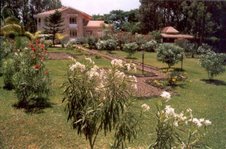I left East Africa on Thursday night and am in a state of shock to be in Amsterdam where it is cold and noisy and modern. On Thursday I spent the day at an airport lodge in a traditional hut-room in the midst of a dessert full of enormous, almost grotesque cacti. I spent time near the pool, in the shade or in my hotel room with the air conditioning blaring. Then, less than 14 hours later, I find myself in Amsterdam at 7:00 AM in the dark with a temperature of about 6 Celsius and nothing but a few layers of cotton clothing.
So, I dashed to the hotel, dropped off my luggage, and hit the stores. Within an hour I was decked out in long pants, a sweater, a warm jacket, gloves and a scarf, and I was ready for Amsterdam. I have spent the past three days walking around the charming streets of this picturesque city, shopping for necessities for Morocco (sleeping blankets, thermal underwear, etc.) and sleeping in! The sleeping in part has been my favorite, as I now feel I am on vacation.
But it was sad to leave East Africa. I have made a lot of friends there and although I was only there for two and a half months, it began to feel like home. At times I get pangs of homesickness for Tanzania.
Visiting Rwanda was an incredible experience. I was hosted by an organization called New Dawn Associates and spent five memorable days with staff from this organization, a charming family of gorillas, staff and children from two orphanages and women from Women for Women International.
Rwanda is a stunning in its beauty. The whole country looks like a finely decorated mosaics of multiple hues of green and red. Outside of Kigali there are virtually no private cars so the highways are teeming with people walking to and from their various engagements. The women here are particularly beautiful and with their brightly colored kangas and graceful figures they are stunning to look at. The country is quite clean, in fact, plastic bags have been outlawed, which cuts down a lot of the trash, and the main roads are pretty good.
The genocide comes up regularly in conversation and there is still concern about the Interhamwe insurgents in the Congo who still make raids across the boarder from time to time. The orphanages I visited were started right after the genocide and many of the children have no idea who their families are, or rather, were. There are youth in their 20s still living in the orphanages because youth don't strike out on their own until they get married, and most of these youth have no family left. Ironically, the children in the orphanages look much healthier and cleaner than the children one sees on the streets as poverty is still a major problem there. It is common in the country side to see children dressed in layers of rags, dirty and many with signs of severe malnutrition. There has been flooding there that displaced hundreds of thousands of families and destroyed crops, and draught conditions earlier in the year also negatively affected crops as most agriculture here is based on rains rather than irrigation systems.
Rwanda's main money making exports are coffee and tea, but the government is in the process of trying to establish the country as an Information Technology hub in the region to diversify the economy and increase revenue. There is controversy as to whether this will work, but it seem like a good move to me because countries that are based on agriculture can't really lift themselves out of poverty. Agriculture just isn't a viable economic engine. Kigali looks a like a modern city in many respects. There are high rise buildings and a very modern shopping mall and very wealthy neighborhoods. They also have a national celebration called "Tax Day", complete with ceremonies and parties in the streets in which everyone congratulates everyone for doing their part to build their country.
I went to the Hotel Milles Collines from the movie Hotel Rwanda, but the manager Paul ...can't remember how to spell his last name, is not quite the hero he makes himself out to be, at least with people I talked to and he is actually vilified in the press, although he might run for president! They say he only really helped those who could pay, and actually turned some people over. There are also really hard feelings toward the French, who it is said, worked the road blocks with the military during the genocide. Rwanda does not have diplomatic relations with France to this day.
I am running out of time on this computer, so more later.

